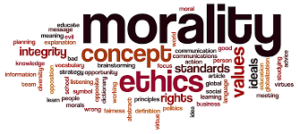 Sex. Sex abuse. Sexual assault. He said. She said. All of these could partially explain the country’s fascination with the train wreck that we refer to as the Supreme Court nomination process. Of course, we’ve seen this before with Justice Clarence Thomas and Anita Hill but the frenzied nature of the 24-hour news cycle wasn’t as hyped as it is now.
Sex. Sex abuse. Sexual assault. He said. She said. All of these could partially explain the country’s fascination with the train wreck that we refer to as the Supreme Court nomination process. Of course, we’ve seen this before with Justice Clarence Thomas and Anita Hill but the frenzied nature of the 24-hour news cycle wasn’t as hyped as it is now.
If the words with which I opened this post can partially explain the attention Brett Kavanaugh and his accusers are receiving, I would argue that those words are only a superficial explanation and not the heart of the matter. In order to get to the heart of it all, we will need to examine how society determines good and evil, truth from falsehood, morality and the lack thereof.
First, we need to acknowledge that our society, particularly in this country, holds a unique understanding of these questions. Our views are not necessarily those of the rest of the world. In the Anglo-Saxon morality of recent years, which also influenced the mentality and the culture of our own societies, this form of discernment between good and bad people led to the appearance of the notion of “character”. The “character” is the subject, on which are “engraved” certain qualities – good or bad – ie., it is the subject of morality. The notion of “character” is especially implemented in art – in fact, in literature, in stories, the theater etc., (for example, we call “characters” the heroes of a literary work).
In our culture, the notion of good or bad differentiates people into good or bad. It’s the ultimate end of morality that it make determinations of who is good and who is bad. Ultimately, that’s at the heart of the Kavanaugh hearings. Senators are scrutinizing words and behaviors to make moral judgments about people, namely Kavanaugh and Blasey Ford. This is the basis for our jurisprudence, our penal system, and our belief in American Exceptionalism.
However, the rest of the world doesn’t necessarily ascribe to this worldview, especially in the East. This other worldview is exemplified in the writings of two oft-ignored figures of the East-Aleksandr Solzhenitsyn and Fyodor Dostoevsky. Solzhenitsyn writes in The Gulag Archipelago,
“If only it were all so simple! If only there were evil people somewhere insidiously committing evil deeds, and it were necessary only to separate them from the rest of us and destroy them. But the line dividing good and evil cuts through the heart of every human being. And who is willing to destroy a piece of his own heart?”
